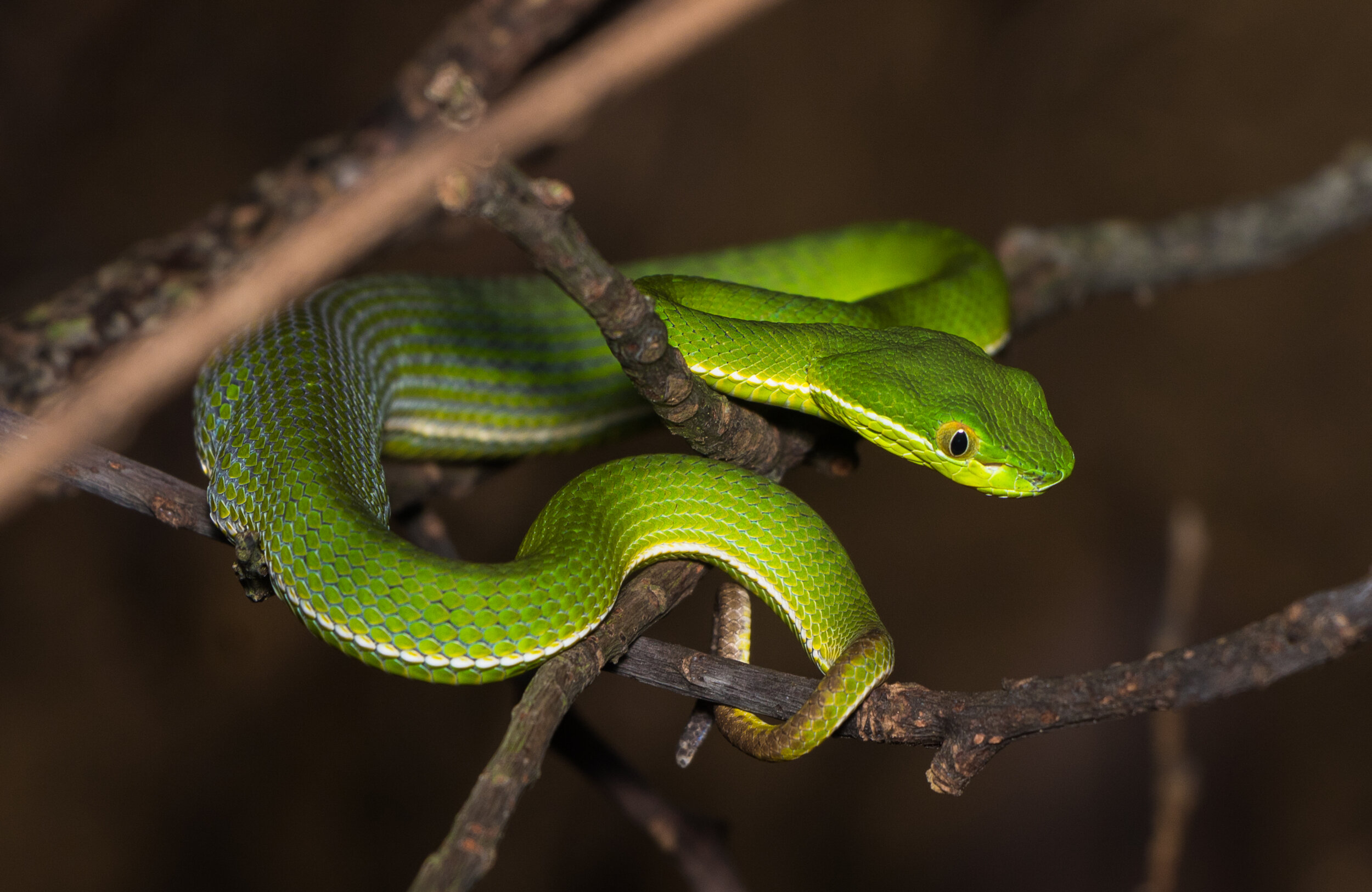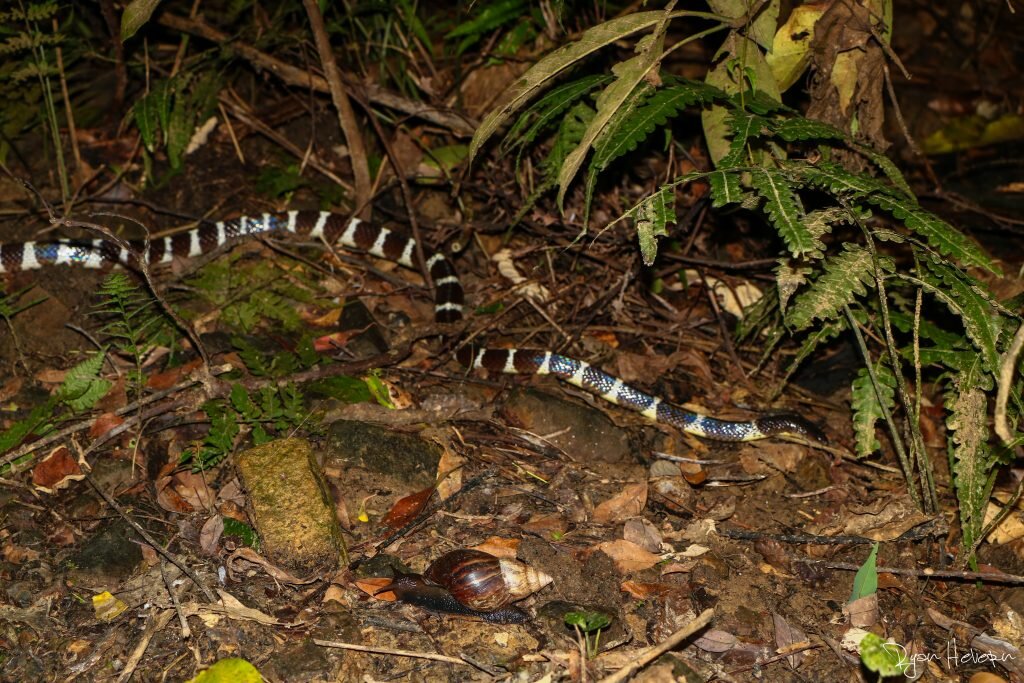Spring is in the air! As the weather heats up and the spring rains come, the flowers bloom and the fauna emerges. Spring time is one of the most enjoyable seasons for hiking in Taiwan, as the ecological diversity is on full display. One of Taiwan's inhabitants emerging from the cold winter are the abundance of snakes! Don't be deterred, as this post will run through some common snakes in Taiwan, and what to do when you come across them.
Snake Encounter DO'S and DON'TS
DO:
It can be quite common to come across a snake while hiking the vast trails in Taiwan. If you happen to encounter one, stay calm and give it some room. Snakes generally feel your vibrations ahead of time and will slither away accordingly. If they do not, try stomping your feet from a distance to encourage it to slither away. If there are no other options, carefully move around it yourself.
DO NOT:
Do not prod at it with a stick, throw rocks, or disturb it in any way. This will only agitate the snake and increase the previously slim chance of catching a snake bite. The general rule of thumb is snakes can strike at half their body length. While side stepping it, make sure to give yourself at least double or triple that distance.
DO:
Keep an eye on the trail ahead of you. If you are hiking in tall grass be sure to look down while walking. In order to give yourself the chance to enjoy the whole of the scenery around you, bring a walking stick to help move the grass and deter snakes.
DO NOT:
Walk blindly over fallen logs, into tall grass, or any other obstacles a snake might want to relax under. Keep your eyes out for snakes under large piles of wood.
DO:
Wear appropriate clothing. It isn't ideal to walk through tall grasses, jungle forests, etc, with flip flops on. Be advised long pants and sturdy boots are the best defense against a snake getting frisky.
Treatment
In the case of a snake bite, one rule is very essential: Stay calm. Keep your heart rate low and look to evacuate the area and seek the nearest hospital or clinic.
Venomous snakes can inject one of three types of venom: Hemotoxins, Neurotoxins, or Myotoxins. Different snakes will require different anti-venoms. In order to identify the snake, take a picture, or mental notes. DO NOT try to catch it, cut off its head, or anything that will lead to more bites.
DO NOT try to suck out the venom, cut around the bite area, or anything you may have seen in the movies. Take off all jewelry and tight clothing or accessories to allow for swelling.
If you are close to a trailhead, slowly make your way out and seek help immediately. In the instance you are far from the trailhead call Emergency services and get an evacuation. If there is no cell service, have a friend hike out or hike up and seek help.
Again, it is important to stay calm, limit your movement, and seek help immediately. Taiwan keeps good stock of anti venom in clinics and hospitals.
To help limit your movement, create a splint around the affected bite area. Do not make it too tight as the limb will swell. This will help you keep the affected area as still as possible while you seek help
Night Hikes!
If you are interested in learning more about the various species of snakes in Taiwan, contact us for one of our Wildlife Night Hikes! We will explore the jungles and streams of Taiwan, often coming across many snakes, endemic amphibians, civets, flying squirrels and more. The purpose of our night hikes is to educate adventurers on the flora and fauna surrounding them. The more you know, the better prepared you will be when you encounter one of these reptiles in the forest! We hope to see you soon!
Common Snakes in Northern Taiwan
Taiwan Habu 龜 殼花 (Brown Spotted Pit Viper)
The Taiwan Habu is highly venomous, and can be spotted camouflaged in with leaf litter on the forest floor. Look for the triangular head, brown diamond like scales on the back with yellow outlines. The Habu is active at night, and hiding under logs or rocks during the day.
Bamboo Pit Viper 赤尾青竹絲
The Bamboo Pit Viper is Taiwan’s “feared” green snake. Active at night, you will spot it slithering around vines and tree branches. This snake is venomous, and can be spotted by the triangular head, red eyes, and red tail.
Greater Green Snake 青蛇
The Greater Green Snake is Taiwan’s “other” green snake, the Non-Venomous kind! You will find this snake perched on tree vines and branches at night, sleeping. You can differentiate the Greater Green Snake from the Bamboo Pit Viper by the shape and size of the head, and the tail color. The GGS is very vibrant, glossy, and a treat to spot!
Square-Headed Cat Snake 大頭蛇
The Square Headed Cat snake is mildly venomous, mostly nocturnal and mostly arboreal. The body is long and slim, and it is a rear fanged species. The Cat Snake gets its name from the cat like pupils.
Red-Banded Snake 紅斑蛇
The Red Banded Snake is non venomous, and one of the most common nocturnal snakes in Taiwan. This snake is known for its defensive nature, and will readily bite if disturbed.
Many-Banded Krait 雨傘節
The Many-Banded Krait is highly venomous, and can be quite common while hiking at night in humid areas. The Many-Banded krait is not aggressive unless provoked. In most encounters the snake will freeze or flee to avoid any interaction. Be careful and do no disturb this snake, as you have to go to Australia to find a more venomous bite!
Night Hikes in Northern Taiwan: Common Reptiles & Amphibians
A field guide for all adventurers is available for Kindle and Paperback!







